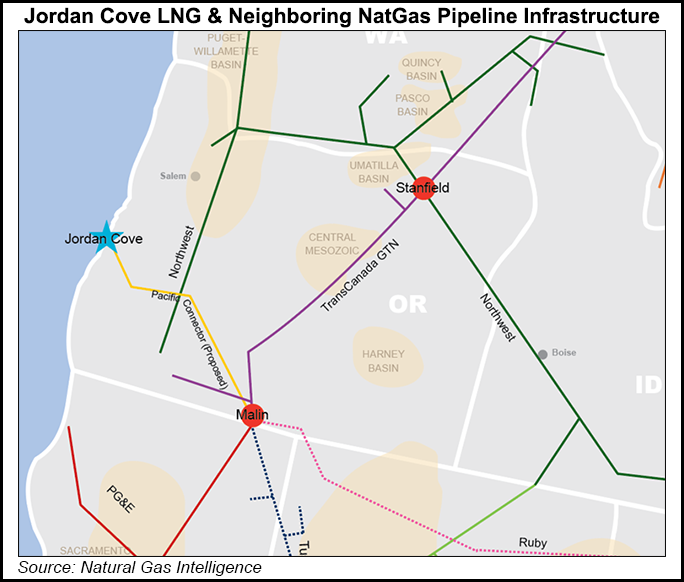Regulatory | Infrastructure | LNG | LNG Insight | NGI All News Access | NGI The Weekly Gas Market Report
Jordan Cove LNG Export Project Said Still Facing Uphill Battle
Even after gaining a long-sought FERC approval last month, the Jordan Cove transmission pipeline and liquefied natural gas (LNG) export terminal project along the south-central Oregon coast is facing substantial state opposition.

Calgary-based Pembina Pipeline Corp. has provided a dearth of information on the project’s future, but sources in Oregon indicate the chances it will be built are low because of a lack of contracted supplies and failure to get key state approvals.
Since Pembina took over Jordan Cove in 2017, it has not moved the project forward beyond the Federal Energy Regulatory Commission approval and some local approvals in the state. Construction is supposed to begin by March 2023 and be completed in 2025.
Pembina Senior Vice President Harry Andersen has emphasized the “science basis” of the FERC OK, stressing that it underscores environmental compliance and viability to become the first U.S. West Coast export terminal.
Oregon Department of Energy’s Sean Mole, federal projects coordinator, said nine of 14 local permits granted to Jordan Cove have been appealed to the state land use appeals board, along with several federally delegated state actions that are unresolved.
Jordan Cove lacks the Oregon Department of Environmental Quality approval for a water permit, as well as Department of State Lands (DSL) permit on dredging and a Coastal Zone Management Act (CZMA) permit.
In some cases, these permits have already been denied at least once, according to Mole.
In late February, the Department of Land Conservation and Development objected to the CZMA application, effectively denying certification, prompting an appeal to the U.S. Commerce Department.
Disruptions from the coronavirus and global oversupply of LNG should not affect the state’s ability to process applications from Jordan Cove, Mole said. “All of this doesn’t delay the state’s ability to take on permitting. Most agencies are still working, still staffed, and working remotely,” he said.
The series of state rejections embolden long-standing organized opposition to the export terminal and 229-mile Pacific Connector Pipeline, including environmental groups and the Klamath Native American Tribe.
© 2024 Natural Gas Intelligence. All rights reserved.
ISSN © 1532-1231 | ISSN © 2577-9877 | ISSN © 1532-1266 |
